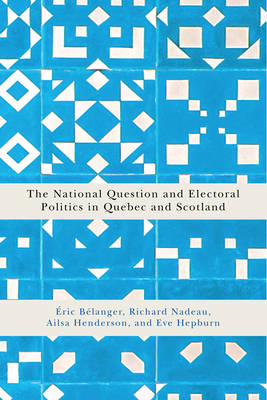
- Afhalen na 1 uur in een winkel met voorraad
- Gratis thuislevering in België vanaf € 30
- Ruim aanbod met 7 miljoen producten
- Afhalen na 1 uur in een winkel met voorraad
- Gratis thuislevering in België vanaf € 30
- Ruim aanbod met 7 miljoen producten
Zoeken
Omschrijving
In Quebec and Scotland, questions of constitutional change, national identity, and national grievance play an important role in the electoral calculations of political parties and voters. Taking a strong stance on the national question can have strategic benefits both for parties pushing for greater autonomy and for those endorsing the status quo. In this in-depth look at issue voting, authors Éric Bélanger, Richard Nadeau, Ailsa Henderson, and Eve Hepburn examine how the national question affects political parties and voter behaviour in both substate nations. Through party manifestos, interviews with legislators, and opinion survey data, this book demonstrates that calls for constitutional change influence political debate, competition, voter choice, and the outcome of elections not only within Quebec and Scotland but also across Canada and the United Kingdom. Minority nationalist parties, the authors show, can gain support by claiming ownership of issues with widespread public agreement, such as self-determination and protecting the identity and interests of the nation. A comprehensive analysis of recent electoral politics, The National Question and Electoral Politics in Quebec and Scotland greatly enhances our understanding of the electoral impact of substate nationalism.
Specificaties
Betrokkenen
- Auteur(s):
- Uitgeverij:
Inhoud
- Aantal bladzijden:
- 304
- Taal:
- Engels
- Reeks:
- Reeksnummer:
- nr. 3
Eigenschappen
- Productcode (EAN):
- 9780773553279
- Verschijningsdatum:
- 30/04/2018
- Uitvoering:
- Paperback
- Formaat:
- Trade paperback (VS)
- Afmetingen:
- 152 mm x 226 mm
- Gewicht:
- 453 g

Alleen bij Standaard Boekhandel
+ 106 punten op je klantenkaart van Standaard Boekhandel
Beoordelingen
We publiceren alleen reviews die voldoen aan de voorwaarden voor reviews. Bekijk onze voorwaarden voor reviews.











